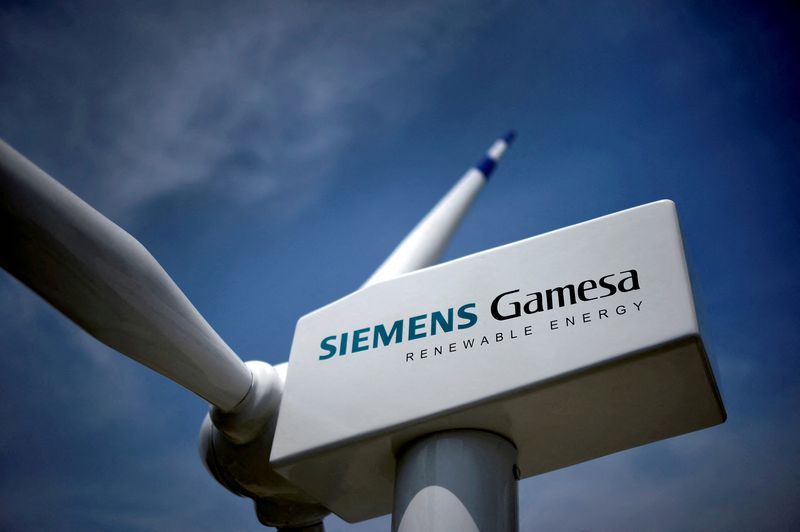By Ludwig Burger and Christoph Steitz
FRANKFURT (Reuters) -Siemens Energy on Saturday launched a 4.05 billion euro ($4.28 billion) bid for minority holdings in struggling wind turbine unit Siemens Gamesa, hoping to remove a complex ownership structure that has weighed on its shares.
The bid at 18.05 euros per share constitutes a premium of 27.7% over the last unaffected closing share price of Spanish-listed Siemens Gamesa at 14.13 euros on May 17 and is a 7.8% premium to Friday's closing price.
Siemens Energy has faced mounting shareholder pressure to seek total control of Siemens Gamesa (SGRE), in which it owns a 67% stake inherited after a spin-off from former parent Siemens.
Despite that stake, Siemens Energy has been unable to exert significant influence to deal with product delays and operational problems at Siemens Gamesa, which has issued three profit warnings in less than a year.
"It is critical that the deteriorating situation at SGRE is stopped as soon as possible and the value-creating repositioning starts quickly," said Joe Kaeser, Siemens Energy's supervisory board chairman.
Sources told Reuters in January that Siemens Energy was exploring options to acquire the remaining stake in Siemens Gamesa and a deal could materialise by summer.
Siemens Energy said it plans to finance up to 2.5 billion euros of the transaction with equity or equity-like instruments, adding that a first step could be a capital increase without subscription rights.
The remainder would be financed with debt as well as cash on hand, Siemens Energy said, adding that it aims to delist Siemens Gamesa. Spanish stock market regulations allow that once 75% ownership is reached.
Full integration of Siemens Gamesa will simplify Siemens Energy's structure and provide a more coherent business model that caters to legacy energy assets such as coal and transition technologies such as gas and renewables.
"This transaction comes at a time of major changes affecting global energy," said Siemens Energy Chief Executive Christian Bruch. "Our conviction is that current geopolitical developments will not lead to a setback to the energy transition."
Siemens Energy said the deal would lead to annual cost savings of up to 300 million euros within three years of full integration, mainly owing to more favourable supply chain management, combined administration and joint R&D.
The deal is expected to close in the second half of the year, the group said.

Former parent Siemens, which directly holds 35% in Siemens Energy, said it would not participate in a cash call, which would dilute its stake, a company spokesperson said.
($1 = 0.9470 euros)